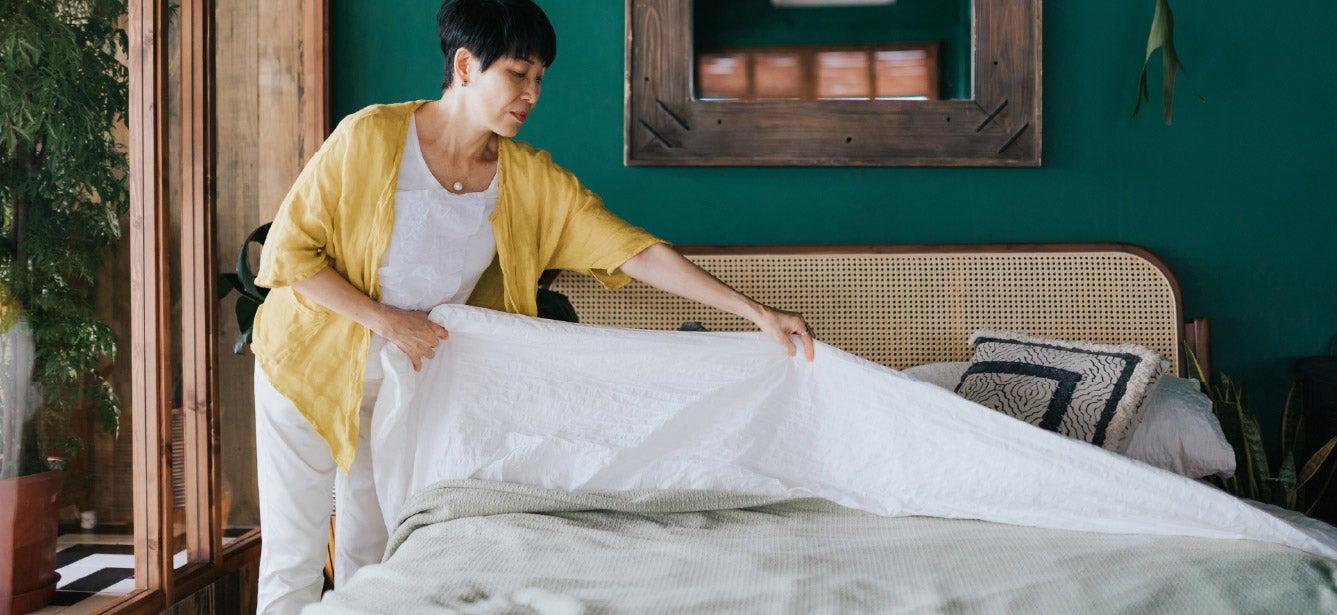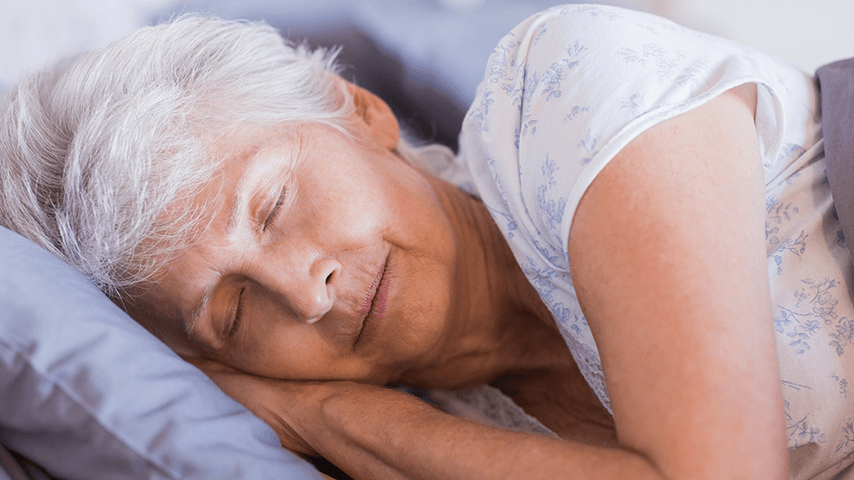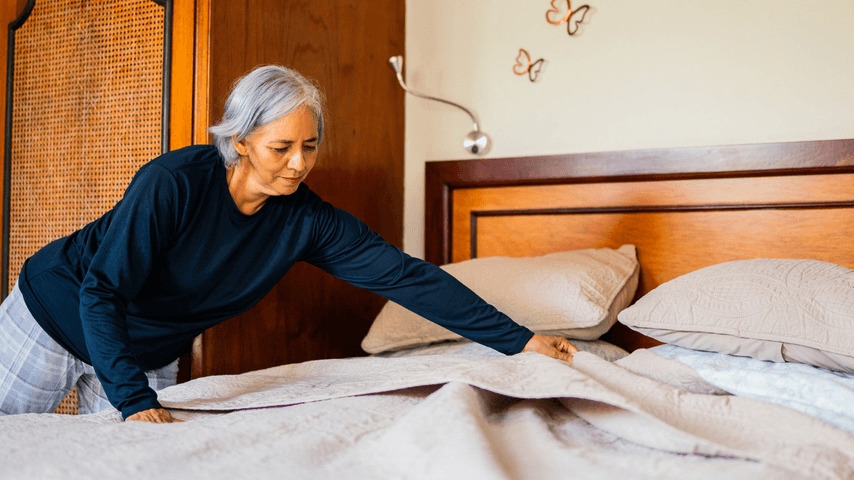
Related Topics
Do you spend most nights tossing and turning in bed? Does it feel like ages since you got a really good night’s sleep? You’re not alone. According to the Centers for Disease Control and Prevention (CDC), roughly 1 in 3 American adults reported not getting enough rest or sleep every day.1
Sleeping well is vital to our health and longevity. It’s especially important for older adults. This article offers tips for creating sleep-friendly habits that make it easier to get the restorative rest you need.
Sleep and aging
There’s a misconception that people need less sleep as they age. But this is not the case—just like younger adults, older adults need 7 to 9 hours of sleep each night. Unfortunately, lack of sleep and aging often go hand in hand. Following are some of the reasons older people may struggle to fall or stay asleep at night.
Poor sleep habits
Over the years, many older adults develop habits that are disruptive to the sleep process. These include consuming caffeine too late in the day, drinking alcohol in the evening, or maintaining an inconsistent sleep/wake schedule.
Insomnia
Insomnia affects people at every age, but it's the most common sleep disorder among adults age 60 and older. With insomnia, you have trouble both falling asleep and staying asleep. This condition can be a temporary nuisance—or develop into a long-term pattern that affects your quality of life.
Sleep apnea
One common reason for older adults not sleeping at night is a condition called sleep apnea. This is when your breathing repeatedly stops for short intervals while you're asleep, which deprives your body of oxygen. If left untreated, sleep apnea can lead to serious health problems such as stroke, cognitive issues, and high blood pressure.
Many adults have sleep apnea and don't even know it. If you feel extra sleepy during the day—or your partner tells you that you snore loudly or make gasping sounds during sleep—talk to your doctor. Lifestyle changes, breathing devices like CPAP machines, and surgery have been shown to help people with this condition. You might also consider one of the best mattresses for sleep apnea to help ease symptoms.
Movement disorders
Movement disorders happen frequently among older adults. One example is restless legs syndrome (RLS), which refers to an uncomfortable urge to move your legs (and sometimes arms). RLS can make it difficult to relax and fall or stay asleep.
Another movement disorder is periodic limb movement disorder (PLMD), which involves repetitive twitching and jerking of the limbs during sleep. Although there is no cure for movement disorders, relaxation techniques and certain medications can help ease symptoms. Choosing one of the best mattresses for restless leg syndrome may help create a more comfortable sleep environment.
Alzheimer’s disease
Alzheimer's disease may impact the sleep-wake cycle for some older adults, causing them to either sleep too much or not sleep enough. Waking frequently at night, wandering, and yelling out are common behaviors among people with this type of dementia.
Since sleep medications can cause side effects, non-drug strategies are often the first line of defense for Alzheimer's-related sleep issues. These strategies may include improving the sleep routine and environment and reducing daytime napping.
Consequences of lack of sleep in older adults
Sleep is just as essential to our overall health as eating well and exercising. Lack of sleep is not just an inconvenience; it can affect our ability to focus on important tasks, dampen our mood, and even increase our risk of falls. Sleep deprivation has also been linked to stroke, obesity, depression, and heart and kidney disease.
If you’re struggling with lack of sleep, you don’t have to suffer silently. There are steps you can take to sleep more soundly. We outline some tips below.
Tips for getting a good night’s sleep
When you’re feeling tired and frustrated, it can be tempting to look for a quick fix. But natural sleep remedies for older adults can work just as well—or even better—than medications. Here are some smart sleep habits to adopt:
- Keep a steady sleep schedule. Going to bed and waking up at the same time each day helps support your body's natural sleep rhythms.
- Make sure you have the right mattress. You spend a lot of time in bed—so choosing the best mattress for you can make all the difference in the quality and duration of your sleep. Adjustable beds, for example, can help you achieve the ideal sleep position and relieve pain that's causing sleep disruptions. Some even have anti-snore features. If pain keeps you awake, consider consider purchasing one of the best mattresses for back pain, rated by our team.
- Avoid heavy meals right before bed. Indigestion from a big meal can make it hard to fall asleep, so keep evening meals and snacks light. It's also a good idea to avoid caffeine, nicotine, and alcohol too close to bedtime—since they can all interfere with sleep.
- Keep napping to a minimum. When you sleep too much during the day, you may feel too alert to settle down at night. Limit daytime naps to no more than one hour and try to restrict them to earlier in the day.
- Wind down before turning in. Create a quiet, calming bedtime routine to help your mind and body relax. This may include reading or listening to your favorite soft music. If you're feeling stressed, try meditation or journaling.
- Avoid screens right before bed. The blue light emitted by smartphones, TVs, tablets, and computers can disrupt our body's circadian rhythms. Unplug from all devices at least 60 minutes prior to bedtime and keep them out of the bedroom.
Another key part of sleeping well is creating a sleep-friendly bedroom environment. Keep reading for tips on setting the stage for a restful night.
How to create a good sleep environment
If your bedroom is noisy, bright, or too hot or too cold, it can affect your ability to sleep soundly. These practices can help you create a soothing, relaxing setting that puts sleep within easier reach:
- Stay cool. Since our body's temperature naturally drops as we drift off to sleep, maintaining a bedroom temp of 60-70 degrees supports the falling-asleep process.
- Minimize noise. A quiet bedroom makes it easier to fall asleep—and can prevent you from waking during the night. Turn off the TV or radio when you're ready to turn in. If you have noisy housemates or neighbors, consider wearing earplugs to bed or using a white noise machine to drown out external sounds.
- Block out excess light. A dark room is best for deep sleep. Room-darkening curtains or shades will help filter out streetlights, car headlights, and other types of light that can illuminate your bedroom. Install a soft nightlight (or keep a flashlight by your bed) so that you can safely navigate the room if you have to get up at night.
- Keep your room tidy. Boxes on the floor, clothes piled in baskets, and other types of clutter can increase stress and pose a safety hazard. Make it a priority to keep your bedroom neat and organized.
Say “good night” to sleeplessness
Lack of sleep and aging don’t have to go together. Try the better-sleep tips in this article for two to three weeks. If you don’t see improvement, talk to your health care provider about other options. Improving your sleep can make a dramatic difference in your waking hours—and it’s a goal worth pursuing.
Frequently asked questions
What is the best treatment for insomnia in older adults?
The first step in treating insomnia is seeing your doctor. If they determine you have insomnia, your provider may recommend lifestyle changes or cognitive behavioral therapy (CBT). In severe cases, they may approve short-term use of over-the-counter or prescription sleep medications.
Why do older adults have trouble sleeping at night?
There are many reasons for older adults not sleeping at night. These range from physical conditions like sleep apnea to poor sleep habits (e.g., drinking caffeinated beverages in the late afternoon).
How can I sleep better at night naturally?
Natural sleep remedies for older adults include sticking to a strict sleep schedule, avoiding screens an hour before bed, and keeping your bedroom cool and dark. Beverages like chamomile tea, warm milk, and tart cherry juice have been found to help patients who experience trouble sleeping. Your doctor may also suggest trying an over-the-counter melatonin supplement.
Sources
1. National Heart, Lung, and Blood Institute. What Are Sleep Deprivation and Deficiency? Found on the internet at https://www.nhlbi.nih.gov/health/sleep-deprivation


